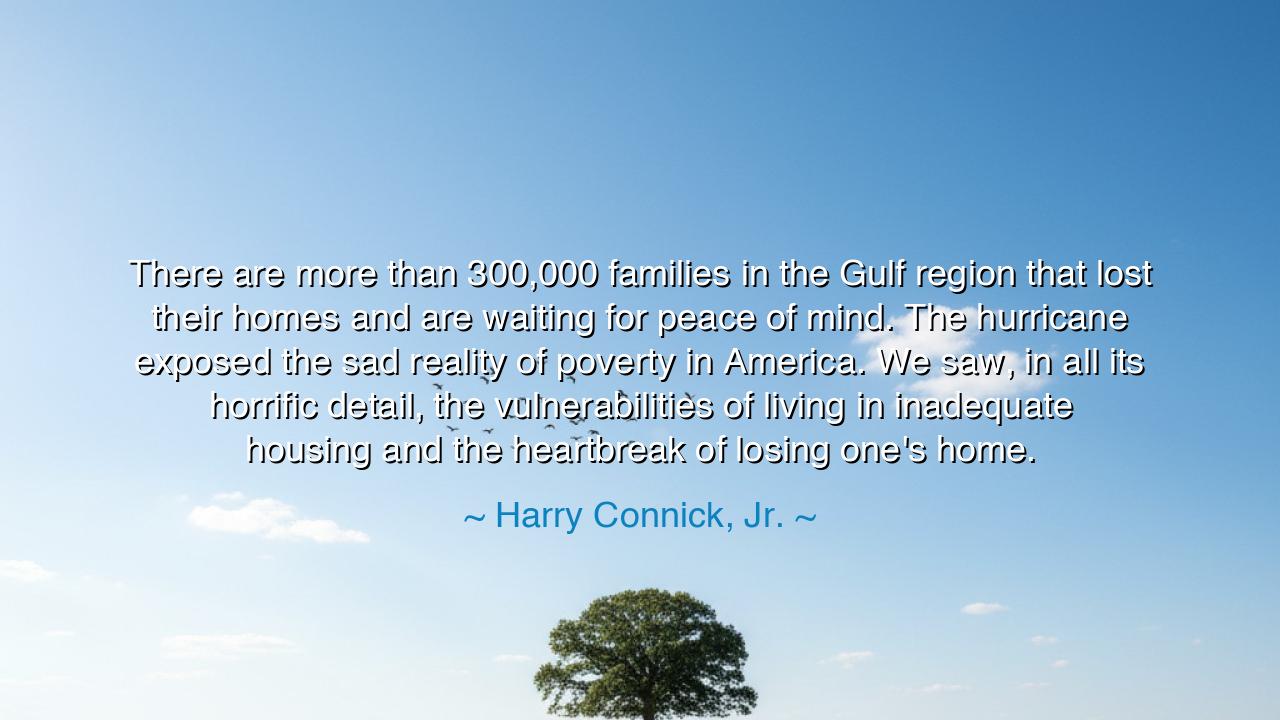
There are more than 300,000 families in the Gulf region that lost
There are more than 300,000 families in the Gulf region that lost their homes and are waiting for peace of mind. The hurricane exposed the sad reality of poverty in America. We saw, in all its horrific detail, the vulnerabilities of living in inadequate housing and the heartbreak of losing one's home.






The words of Harry Connick, Jr. strike like a mournful bell across the ages: “There are more than 300,000 families in the Gulf region that lost their homes and are waiting for peace of mind. The hurricane exposed the sad reality of poverty in America. We saw, in all its horrific detail, the vulnerabilities of living in inadequate housing and the heartbreak of losing one's home.” In this lament, we hear not only the cry of a devastated land, but the eternal truth that human shelter is fragile, and that poverty leaves countless souls exposed to both storm and sorrow.
The hurricane of which he speaks was no ordinary tempest, but a force of nature that revealed the hidden wounds of a nation. For disasters do not strike all equally—those with wealth and stability may rebuild, while those already burdened by want fall into ruin. Thus, Connick reminds us that tragedy is not born from wind and water alone, but from the sad reality that many lived already on the edge of despair. The storm did not create their suffering—it unveiled it, laying bare the hidden face of inequality.
The ancients knew that calamity tests the strength of both people and nations. When plague swept Athens during the Peloponnesian War, it was not only lives that were lost but faith in the very order of society. The poor and the sick suffered the most, and the city was shaken to its foundations. In the same way, the Gulf Coast hurricane revealed the frailty of structures both physical and moral. Inadequate housing was more than weak wood and stone—it was the sign of neglect, the mark of a society that had allowed its most vulnerable to live unprotected.
And what sorrow lies in the loss of a home! For a house is not only walls—it is memory, it is safety, it is identity. To be cast out by storm or fire is to feel torn from the very fabric of one’s life. Connick’s words remind us that to lose one’s home is to lose far more than possessions—it is to lose peace of mind, the sanctuary of the soul. Such heartbreak echoes through time, for every people has known exile, from the Israelites driven into Babylon to the peasants uprooted by famine in Ireland. Always the wound of losing one’s dwelling is among the deepest a human heart can bear.
Yet in this lament there is also a call to responsibility. For though storms cannot be prevented, the devastation they bring can be lessened if society honors its duty to protect the weak. Strong homes, fair opportunity, and compassion for the poor are shields against despair. When these are absent, calamity multiplies suffering. Thus Connick speaks not only of natural disaster, but of human failure: the choice of neglect over care, of indifference over justice.
The lesson, therefore, is clear: let us not wait for disaster to awaken our compassion. Let us strengthen the foundations of our communities now, building not only with brick and stone but with generosity and fairness. Let us honor the dignity of every family by ensuring that housing is not a privilege of the wealthy, but a right of the human heart. For a nation that allows its people to dwell in fragility invites ruin upon itself.
Practical action lies before us all: support efforts to provide safe and affordable housing, give to those who rebuild from loss, and raise your voice for policies that shield the vulnerable from neglect. When you see one who has lost their home, do not turn away—extend your hand, for their heartbreak is the heartbreak of humanity itself. Remember always that storms will come again, but whether they reveal despair or resilience depends on the choices we make now.
So let the words of Connick be not only a lament but a warning and a guide. Let us face the reality of poverty with courage, not avoidance. Let us build a society where even in the fiercest hurricane, no family stands forgotten, no child sleeps unprotected, and no soul loses hope of finding a place to rest. In this, we draw nearer to justice, and we prove that while we are not masters of the storm, we are masters of how we care for one another.






AAdministratorAdministrator
Welcome, honored guests. Please leave a comment, we will respond soon